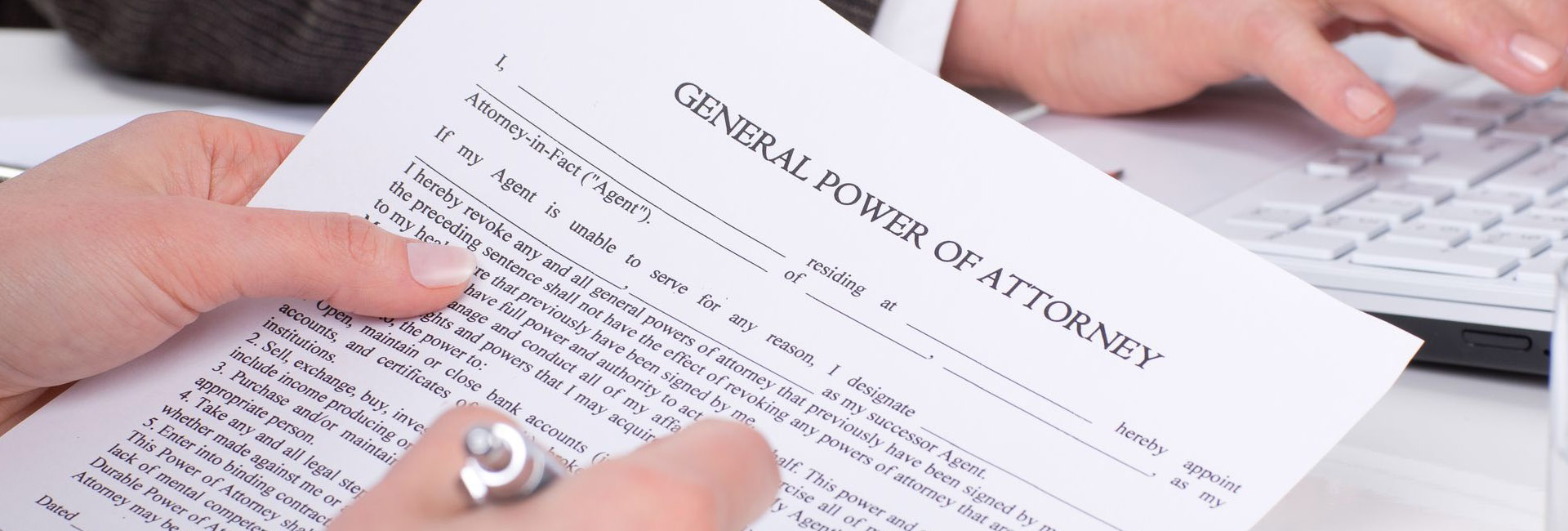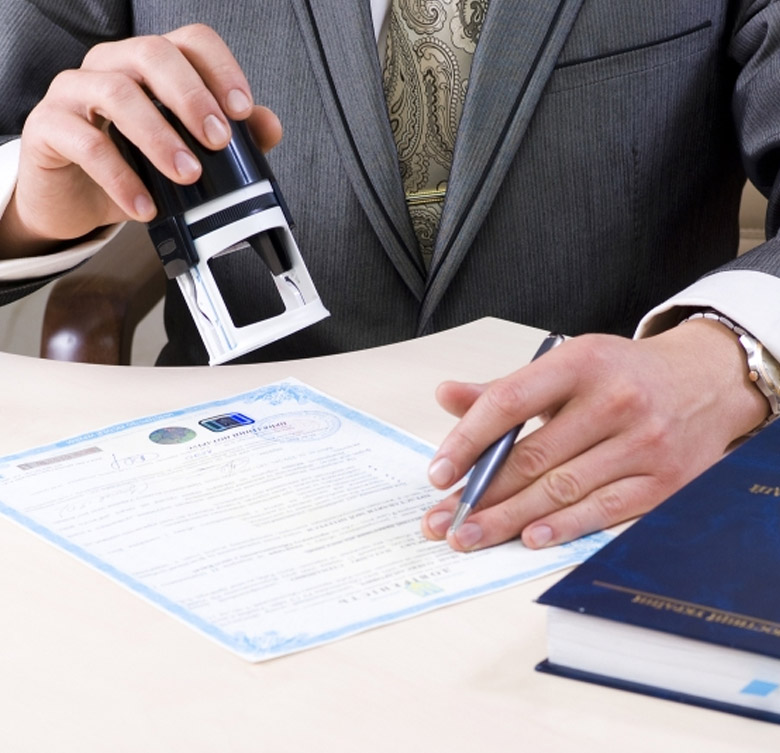
Power of attorney

Be it accident, illness or advanced age, the same unfortunate circumstances that may cause a person's death may not do so instantly but instead induce a state of reduced capacity and capabilities. In other words, there may be a time during one's lifetime when, for these reasons or merely as a convenience, someone trustworthy is needed to act in our stead. Power of Attorney allows for the voluntary appointment of such a person for legal and financial matters. An enduring Power of Attorney additionally specifies the donor's intention that powers granted are to "endure" despite subsequent mental infirmity on the part of the donor.
Representation Agreement
A Representation Agreement makes it possible for a person to articulate legally enforceable requirements and preferences regarding health and personal care.
As its name suggests, a Representation Agreement documents the terms of agreement between the parties thereto rather than those of a unilateral appointment.
Why Give Power of Attorney?
1. Allows you to choose a trusted person to be your attorney instead of the government appointing someone you may not know.
2. Enables you to discuss future needs with your own trusted attorney.
3. Puts your future care in your own hands.


Frequently Asked Question

Powers of Attorney (Specifically for use in BC)
A Power of Attorney (PA) is a legal document evidencing the authority granted by one person (the Donor) to another (the Attorney) to act on his/her behalf in business or financial matters. Being such a simple and inexpensive planning tool, it is often likened to insurance - you hope never to need it but its value is beyond measure if you ever do.
An enduring Power of Attorney provides that the powers granted shall continue to be in effect despite any possible subsequent mental infirmity on the part of the Donor. Without the "enduring clause", an ordinary PA ceases to be effective at the same time as the Donor loses his/her capacity to transact on their own behalf.
Any capable adult can make a Power of Attorney. If a person has a mild intellectual disability or is in the very early stages of dementia, they may still be able to do so but this will depend on their understanding of the document's nature and effect.
If there is doubt concerning capacity, however, an assessment by an appropriate person such as a medical practitioner or psychologist would be required.
No. An attorney in this sense does not mean a lawyer or solicitor. Usually you would appoint a family member or close friend. The most important criteria for your selection of an attorney is that the person be trustworthy, responsible, willing and up to the task. If you do not know any such person, you can appoint a Trust Company or the Public Trustee but it would be prudent to look into their fees for this service in advance. You may wish to refer to the information pamphlet prepared by the Public Trustee describing their role in this regard.
No. No one can legally sign on your behalf in the absence of prearrangement or evidence of your authority to do so. Of course it is OK if the two of you already share "either/or" signing authority on a joint bank account, for example, but for transactions involving assets in your name only or where all co-owners must sign (such as with real estate) - only your signature or that of your legally authorized (by way of PA) signatory will do.
Examples of why you may want to appoint an attorney are situations where:
- you are going to be away/out of communication/in hospital
- you want someone to handle a particular matter for you
- you are physically unable to continue to look after your own affairs
- you want to prepare for the possibility of unexpected mental incapacity. After all, the major causes of death - accident, illness and age - do not always take their toll immediately but can instead result in diminished capacity over an extended period of time. It may be too late by the time you or a loved one realizes you need one.
A number of options exist to assist those who are no longer able to manage on their own and who have not made suitable prior arrangements for such a possibility. Most of these options involve the Public Trustee and/or the courts. On this and related topics, the Public Trustee has prepared an informative publication describing various options.
No. Your own rights are not affected in any way by executing a Power of Attorney, but now there is an additional person besides yourself who can sign on your behalf.
Ideally, you would use and keep up to date your full current legal name for all major transactions and therefore maintain consistency of identity. However, this may not always be the case so one must try to anticipate the possible applications of the Power of Attorney.
For use in a real estate transaction, for example, your name must appear exactly as it does on the title to the subject property and if you own multiple properties using more than one version of your name, you may have to execute more than one PA. This is generally true for other types of business transactions as well though enforcement may be less stringently applied.
Your appointed attorney must act in your best interests at all times and must avoid any conflict with those interests. Your attorney should keep your assets separate from theirs and maintain proper records of their dealings with your assets. While they can convert the form of your assets, they cannot, unless explicitly provided for in the document, use the Power of Attorney to convert ownership of your assets to themselves. Misuse of a PA is a crime and should be reported to the police and/or Public Trustee for investigation.
Yes. There is no legal limit to the number of attorneys you can appoint but in practical terms remember the old adage about "Too many cooks…" Further, in light of your reason for having opted for multiple attorneys, you will have to decide whether they "may act separately" or "must act together".
Particularly for an enduring Power of Attorney to provide for possible future mental infirmity, you may want to consider appointing more than one attorney. Typically, for example, spouses will appoint each other, but what if you're in the same auto accident? What if one who has been caring for the other suddenly dies? If you are fortunate enough to have more than one trustworthy and capable adult to choose from who will not work against each other, it may be of value in the long run and does not affect the cost of preparation.
That generally encompasses most business and financial matters taking place in British Columbia. Be aware, however, to a PA not being readily accepted for other reasons. Sometimes the other party to a transaction may insist upon dealing directly with the Donor. For example, some mortgage lenders may not feel comfortable with execution of their documentation by PA. . One common example of something one cannot sign by PA is a Last Will and Testament.
Yes. While a Power of Attorney starts out general in nature, it can be made specific by either limiting the powers to certain functions or by excluding certain functions from the otherwise general powers granted. Careful wording should be used so as not to trigger an unanticipated evidentiary requirement of the attorney (ie that they would have to prove something beyond their own identity before acceptance of the PA).
A Power of Attorney comes into effect upon its execution and ceases to be effective upon the Donor's death, bankruptcy or revocation of the PA. It is therefore important to manage the document in terms of its possession. You have the option of giving the PA to your attorney at any time or instead leaving it with a trusted individual for safe-keeping until the time is right for the attorney to use it. Because a PA cannot overlap into estate matters, the attorney must upon the death of the Donor relinquish authority in favour of the executor appointed in the Donor's (now Testator's) Will.
BC's Power of Attorney Act does prescribe a form of document and allows for either the appointment of one attorney or for the appointment of more than one attorney. Financial Institutions may have their own forms of PA to be used internally regarding their client's accounts but they are not for general or widespread use, only specific to that particular bank or credit union.
Until recently, there was no registry specifically established to record the existence of Power of Attorney arrangements. The Nidus Registry now fills that role, but registration is optional. A PA can also be registered at the Land Title Office and, in fact, it must be registered if it is to be used in a real property transaction.
No. The authority granted in a Power of Attorney is more in the area of business and financial matters. It does not include the power to make personal, medical or life decisions on your behalf. Representation Agreements, however, can contain such provisions.
Once you have decided upon the attorney(s) to be appointed and the powers to be granted by your PA, there remain two practical considerations in making a Power of Attorney:
The firs consideration t is the accurate preparation of the document to ensure that your objectives are accomplished.
The second is that it be properly witnessed. To be fully effective, a PA made pursuant to BC's Power of Attorney Act will require "Officer Certification" meaning execution of the document in the presence of a witness who is authorized under the Evidence Act to take affidavits for use in BC, such this office, being a Notary firm. We can help with both and get you started right now.
There is this helpful pamphlet available through the People's Law School http://www.publiclegaled.bc.ca/index.asp and at the Nidus Registry site http://www.nidus.ca.
There are a number of excellent resources available the Nidus Registry site.
